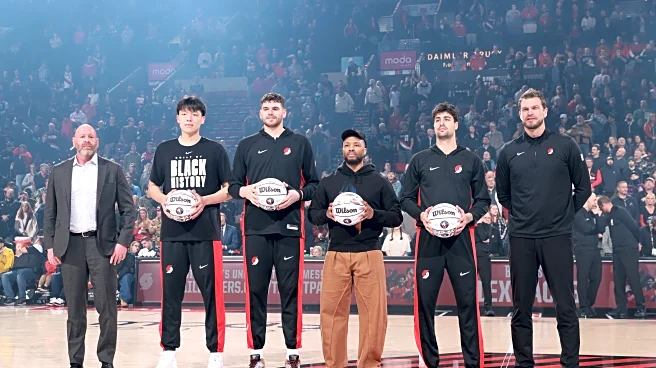What's Happening?
Trent Grisham, a key player for the New York Yankees, is projected to secure a lucrative contract following a standout season. Grisham, who joined the Yankees as part of a trade involving Juan Soto in 2024, has become a significant contributor to the team's
offense. In the 2024 season, Grisham achieved career highs with an OPS of .811 and 34 home runs over 143 games. As he enters free agency, ESPN's Kiley McDaniel predicts Grisham will sign a four-year, $90 million deal, capitalizing on his recent performance. Despite previous struggles, Grisham improved his batting average to .235, complemented by 82 walks and 34 homers. While his defensive skills in center field have declined, his offensive capabilities make him a valuable asset.
Why It's Important?
Grisham's potential contract highlights the financial dynamics of Major League Baseball, where players can leverage career-best performances for substantial paydays. His projected deal underscores the importance of timing and performance in securing favorable contracts. For the Yankees, retaining or losing Grisham could impact their strategic planning and roster composition. The deal also reflects broader trends in player valuation, where offensive prowess can outweigh defensive limitations. As Grisham enters free agency, teams will weigh his recent success against long-term consistency, influencing market dynamics and contract negotiations.
What's Next?
As Grisham enters free agency, teams will evaluate his performance and potential fit within their rosters. The Yankees may attempt to retain him, but other teams could offer competitive contracts. Grisham's decision will likely depend on contract terms and team prospects. His move could influence other free agents and set a precedent for similar players seeking contracts. The outcome will affect team strategies and player market values, with potential ripple effects across the league.
Beyond the Headlines
Grisham's situation highlights the evolving nature of player contracts in MLB, where analytics and performance metrics increasingly influence negotiations. His case may prompt discussions on balancing offensive and defensive skills in player valuation. Additionally, it raises questions about the sustainability of performance-based contracts and their impact on team budgets and player expectations.


















